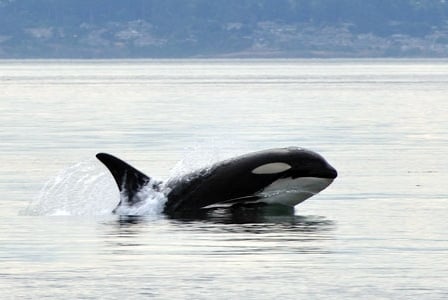
This Wildlife Wednesday, learn about the killer whale, and new research showing why adult sons still need their moms.
Killer whales—or orcas—are an iconic image of Canada’s West Coast. They’re also the biggest species in the dolphin family and one of the top predators in the ocean. But new research is shedding the light on how these marine superstars are actually quite vulnerable—at least the males.
Habitat: both the open ocean as well as shallow seas of every ocean on the planet
Killer whale trivia
- Killer whales can reach speeds of up to 55 kilometres per hour, making them one of the fastest sea mammals. In addition to their speed, killer whales have developed several complex and highly social strategies to help them hunt, including coordinated attacks and herding. Working in groups of up to 40 individuals, they’ve even been known to take on massive whales, such as blue or grey whales. Because of these strategies, they have been compared to wolf packs.
- Aboriginal legends often feature killer whales. They can either be seen in a positive light (as the soul of a human) or in a negative light (as a vicious killer).
- Like many other types of whales, killer whales are very communicative, and converse with each other through sounds and echolocation. Each pod (group) of killer whales has its own distinct sounds, recognizable to other groups. According to the Vancouver Aquarium, killer whales are the most socially and ecologically complex creatures after humans, and pass down traditions through generations.
- With all this talk about the killer whale’s amazing hunting skills, it can be easy to forget just how vulnerable they are. For example, new research has shown why female killer whales have the longest menopause—and live the longest after reproductive years—than any other nonhuman animal: to take care of their adult sons. Yup, adult male killer whales need their moms to stick around in order to truly thrive and flourish; they experience a 14-fold increase in the likelihood of their death one year after their mom dies. The moms help their sons survive and reproduce. Females, on the other hand, are much more self-sufficient.
Why they’re threatened and how you can help
Some populations of killer whales are threatened; however, scientists are unsure about the species as a whole, due to a relative lack of data. You can help killer whales by taking part in the Vancouver Aquarium’s Wild Killer Whale Adoption Program, which supports British Columbia’s wild killer whale population.

